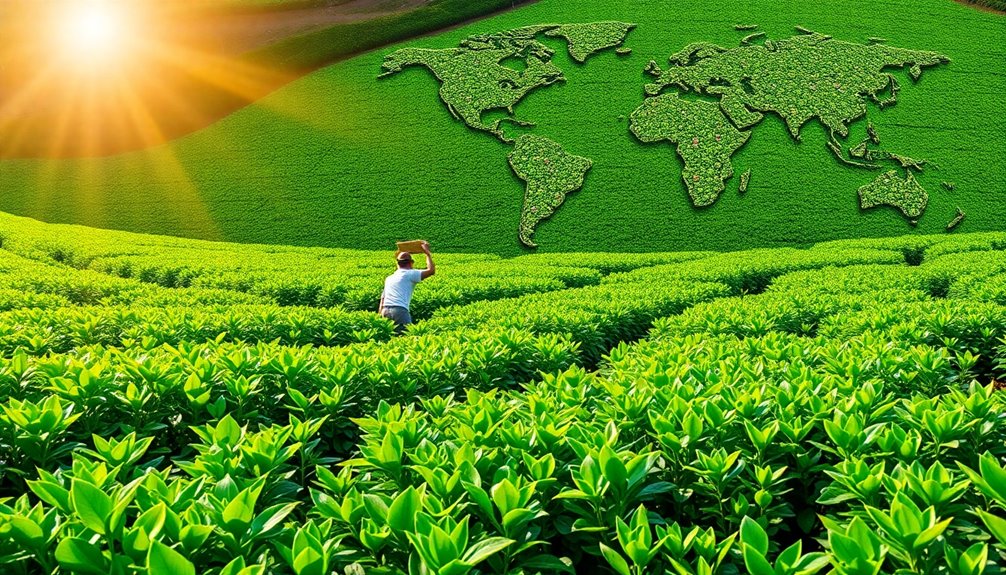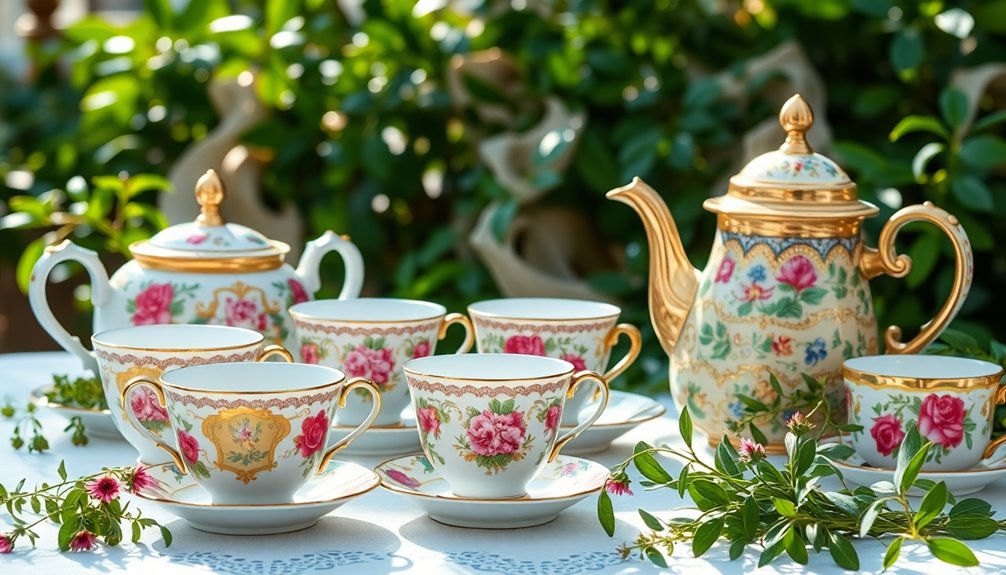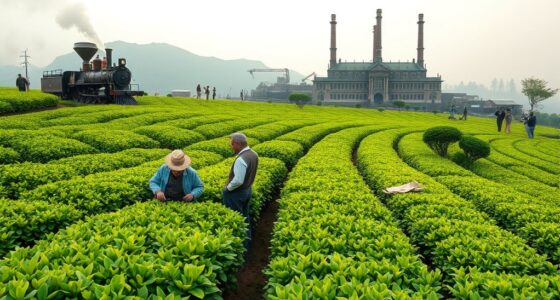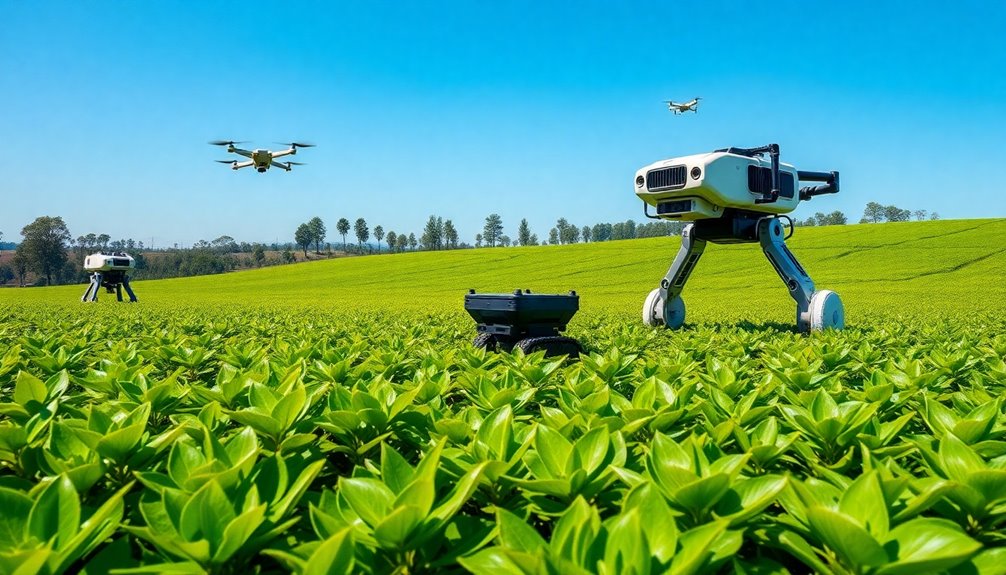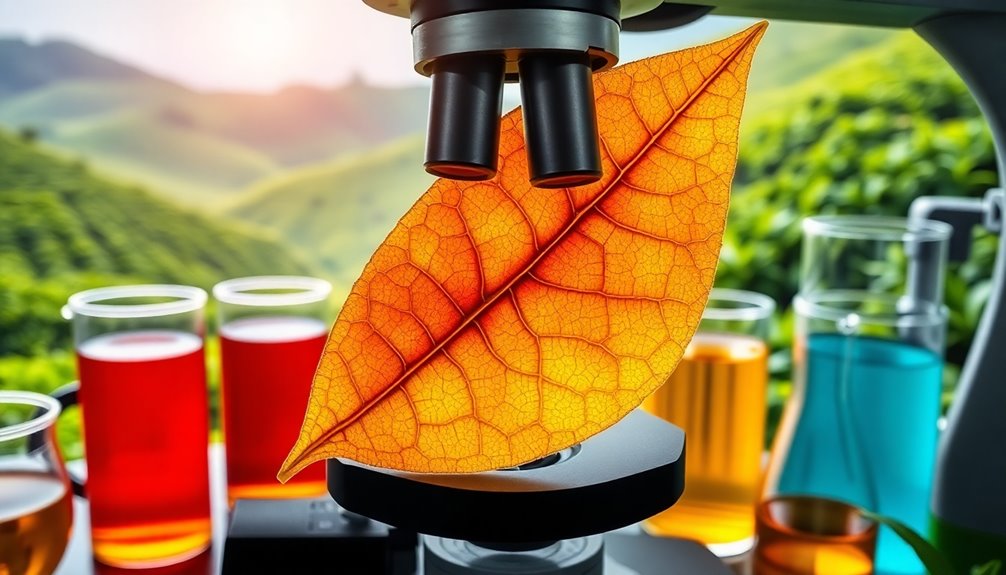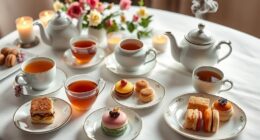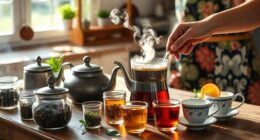You'll find that tea consumption worldwide has surged by 8.8%, largely due to a growing preference for healthier beverages. People are increasingly seeking natural and functional drinks, leading to a boom in herbal tea sales, which rose by the same rate. Ready-to-drink options are becoming popular too, especially with younger consumers chasing convenience. The market's evolving, with innovative products like tea-infused cocktails gaining traction. Plus, the emphasis on sustainable sourcing is shaping consumer choices as well. There's so much more beneath this trend, and you won't want to miss the details that reveal why tea is taking the world by storm.
Key Takeaways
- Global tea consumption has surged by 8.8%, driven by health-conscious choices and increasing demand for natural beverages.
- The market value of tea is projected to reach US$277.30 billion by 2024, highlighting significant growth potential.
- At-home tea consumption is expected to grow at a rate of 5.79% annually from 2024 to 2029, reflecting changing consumer habits.
- Herbal tea sales are rising, with an 8.8% increase fueled by wellness trends and natural remedies.
- The ready-to-drink tea market is projected to expand from $34.3 billion in 2023 to $72.8 billion by 2033, showcasing convenience-driven popularity.
Introduction
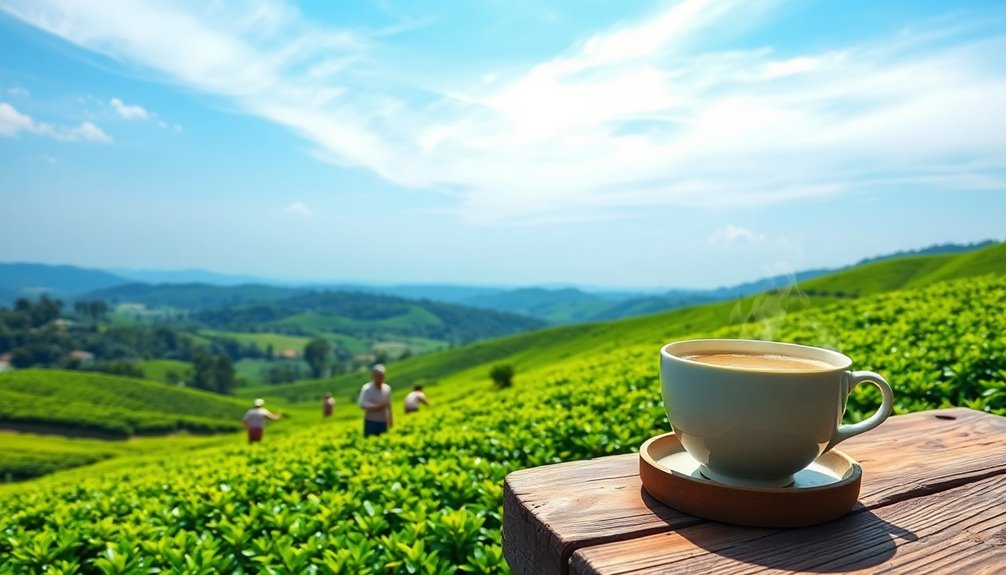
Tea has become one of the most beloved beverages around the globe, and its popularity shows no signs of waning. The global tea market is projected to reach a staggering US$277.30 billion by 2024, reflecting a strong consumer preference for this versatile drink.
As you explore the tea industry, you'll notice a significant growth trend, particularly among health-conscious consumers. Health benefits associated with tea are driving an impressive 8.8% increase in overall consumption, especially among those seeking functional teas that offer specific wellness advantages.
At-home tea consumption is expected to grow at an annual rate of 5.79% from 2024 to 2029, indicating a shift in consumer habits towards enjoying tea in more personal settings.
Furthermore, the ready-to-drink (RTD) tea market is set for dramatic expansion, with projections soaring from $34.3 billion in 2023 to $72.8 billion by 2033. This growth highlights the appeal of convenient tea options for busy consumers.
As you navigate this evolving landscape, you'll find that tea isn't just a beverage; it's a lifestyle choice for many who prioritize health and convenience.
Global Tea Consumption Surge
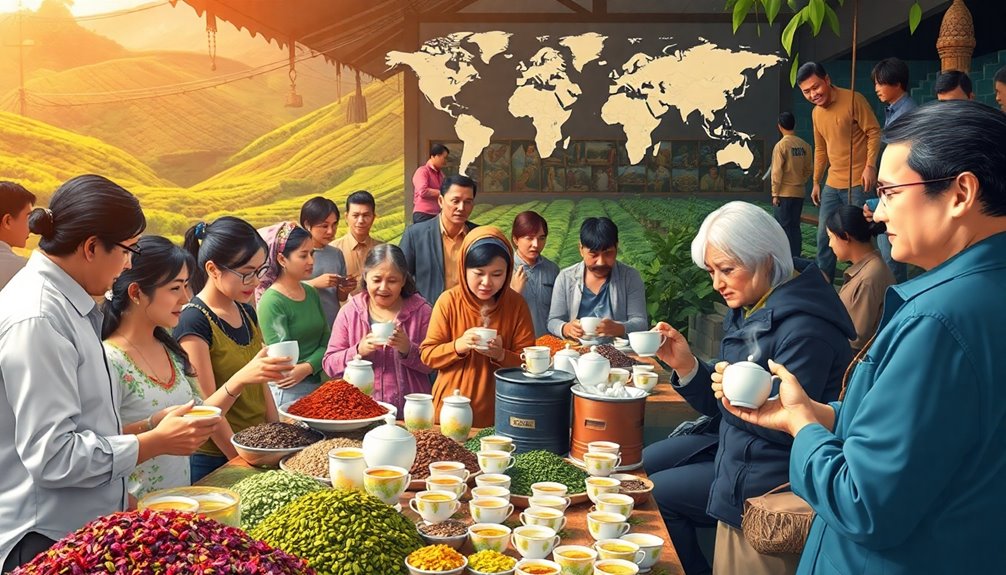
In recent years, global tea consumption has surged by an impressive 8.8%, reflecting a shift towards health-conscious choices among consumers. This increase is driven by a growing consumer demand for natural and functional beverages. Herbal teas, which are known for their health benefits and unique flavors, are becoming a popular choice for those seeking caffeine-free options. The caffeine content in various tea types makes them a preferred alternative to energy drinks for many health-conscious individuals. Additionally, consumers are increasingly drawn to tea varieties that offer unique qualities, such as the antioxidants found in green tea.
You may have noticed the rising popularity of ready-to-drink tea options, which are projected to grow from $34.3 billion in 2023 to $72.8 billion by 2033. Convenience is key, and tea consumers are seeking easy ways to enjoy their favorite brews.
In the U.S., a staggering 83% of adults regularly drink tea, showcasing its widespread appeal. However, the market growth here is primarily fueled by price increases rather than actual volume sales growth.
Meanwhile, Germany's tea market is expected to see a volume sales growth of 4.8% from 2023 to 2028, driven largely by the increasing popularity of organic tea varieties.
In China, the tea market is on track to reach RMB370.8 billion by 2027, reflecting evolving consumption habits and a deepening appreciation for tea culture. Sustainability in tea production is also becoming a crucial factor, as consumers increasingly seek ethically sourced and environmentally friendly options.
Herbal Tea Sales Skyrocketing
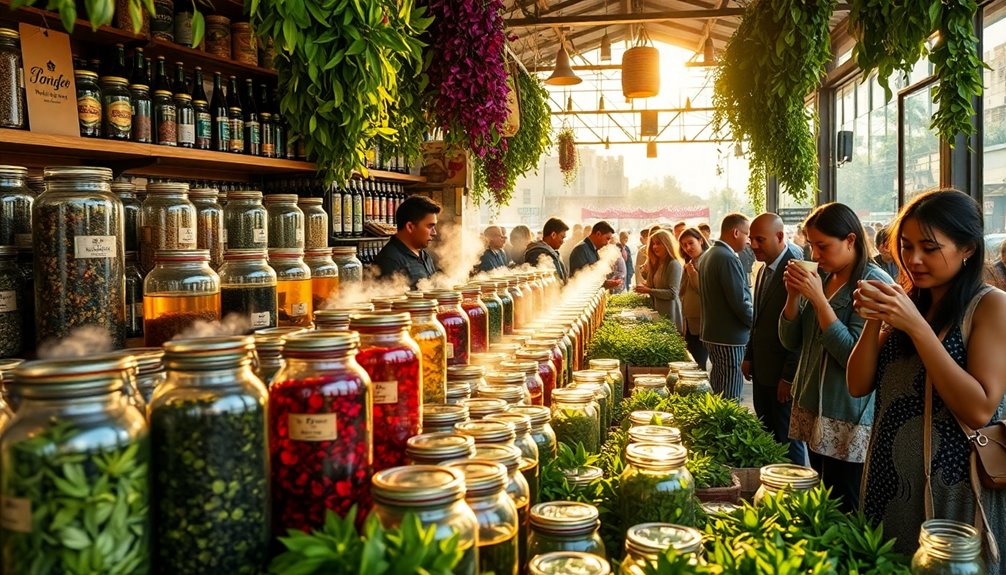
Herbal tea sales are skyrocketing, fueled by a strong consumer focus on health and wellness. With an impressive 8.8% growth, this trend reflects your desire for natural alternatives that promote better living.
Popular herbal varieties, like chamomile and ginger, are particularly favored by health-conscious individuals seeking organic products that offer specific health benefits. Rooibos, known for its antioxidant properties, has also gained popularity among those looking for caffeine-free options. Additionally, herbal teas are often celebrated for their potential to reduce inflammation, making them an attractive choice for many consumers.
As you become more aware of the importance of functional beverages, herbal teas are increasingly recognized as vital components in your daily routine. The shift toward natural and organic products aligns perfectly with consumer demand for healthier options, making herbal tea an appealing choice.
Marketing the health benefits of these teas can effectively resonate with you and others who prioritize wellness, enhancing brand alignment with current health trends.
Consumer insights reveal that many of you're actively seeking beverages that not only taste good but also contribute positively to your overall well-being. Additionally, incorporating herbs like turmeric into herbal teas can further amplify their health benefits, offering anti-inflammatory properties and promoting overall wellness.
This surge in interest means that herbal tea companies are focusing on innovative marketing strategies to showcase the numerous health benefits, ensuring that you have access to the finest selections on the market.
Rise of Tea-Infused Cocktails
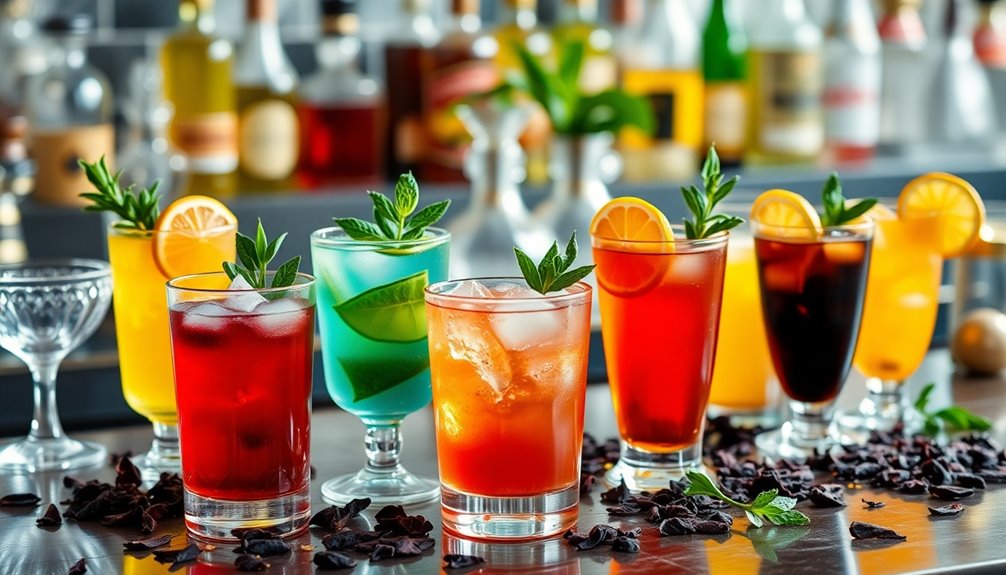
The Surprising Growth of Tea Consumption Worldwide
Rise of Tea-Infused Cocktails
As the trend of health-conscious choices continues to shape beverage preferences, the rise of tea-infused cocktails captures your attention. The hard tea category, which includes these flavorful beverages, is projected to grow nearly 25% through 2030, highlighting a robust consumer interest in innovative beverage options.
In 2021, the market for hard teas was valued at $2 billion, with major players like Boston Beer leading the charge. Essential oils can also complement the flavor profile of tea-infused cocktails, enhancing their aromatic qualities.
Ready-to-drink tea segments are gaining traction, reflecting a shift in consumer preferences towards convenient, flavorful beverages. The versatility of tea allows it to be seamlessly integrated into various cocktail recipes, with trendy flavors like matcha tea and hibiscus catching the eye of mixologists and consumers alike. This trend aligns perfectly with the broader health and wellness movement, as more people seek out drinks made from natural ingredients that potentially offer health benefits. Moreover, the incorporation of probiotics from kombucha in cocktails is gaining popularity, adding an extra layer of health appeal.
Cultural Appropriation in Tea Marketing
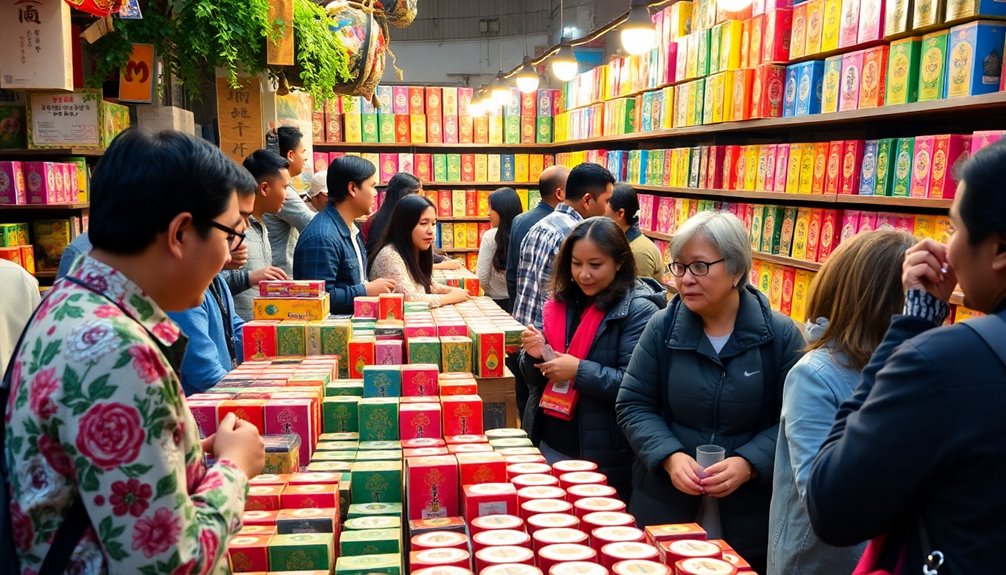
Cultural appropriation in tea marketing frequently sparks debate, particularly when traditional practices from regions like China and Japan are commercialized without proper acknowledgment.
You might notice how brands package matcha tea in Western markets, often stripping it of its cultural significance in Japanese traditions. This repackaging can lead to consumer backlash and eroded trust if brands fail to engage authentically with the communities from which these practices originate.
As a consumer, you likely prioritize ethical sourcing and sustainability, which have become vital in today's tea market. Brands that embrace transparent storytelling can mitigate concerns about cultural appropriation.
By respecting and honoring the traditions behind their products, they align with your values and foster deeper connections.
With approximately 92% of consumers emphasizing sustainability and ethical practices, tea brands must navigate cultural representation thoughtfully.
It's essential for them to honor traditional tea practices while appealing to modern consumer values. When brands genuinely engage with cultural heritage, they not only avoid appropriation but also build trust and loyalty among conscientious consumers like you.
Practical Applications
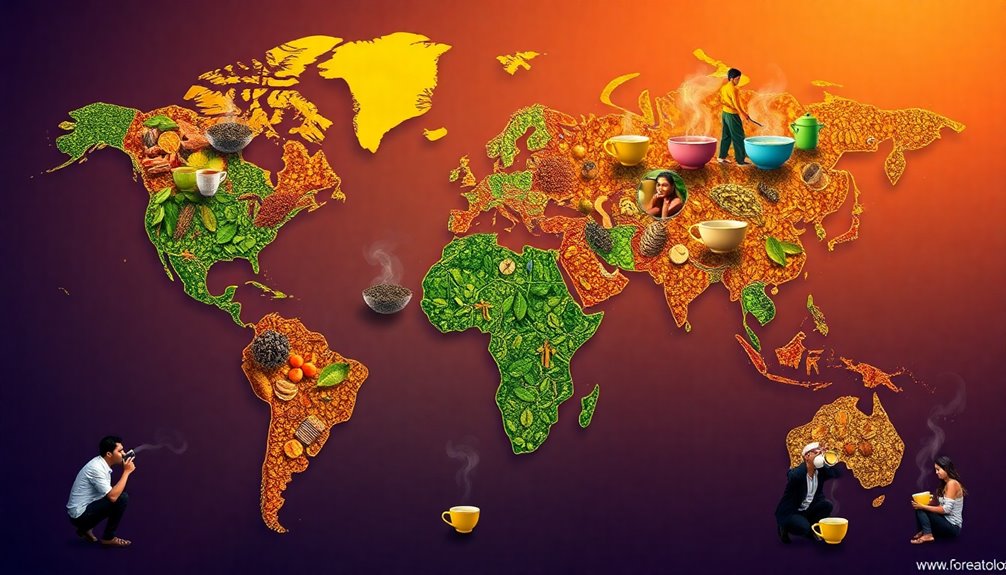
Practical applications of tea consumption are increasingly relevant as you navigate a market that's evolving rapidly. The global tea industry is projected to generate a staggering US$277.30 billion by 2024, fueled by a growing consumer base embracing both at-home and out-of-home consumption.
As a health-conscious consumer, you'll notice herbal teas are gaining traction, with an impressive 8.8% growth, thanks to their wellness benefits and functional ingredients. Studies suggest that ginger can reduce pain intensity during menstruation, making herbal teas even more appealing for those seeking natural relief.
The ready-to-drink (RTD) tea segment is also surging, expected to leap from $34.3 billion in 2023 to $72.8 billion by 2033. This shift highlights your preference for convenience in tea consumption.
Interestingly, nearly 60% of you view hot black tea as a healthy choice, reinforcing the trend toward functional beverages.
Sustainability plays a vital role in your purchasing decisions, as over a third of tea products now come in eco-friendly packaging. This reflects a growing consumer demand for ethically produced items.
Market research indicates that these trends aren't just passing fads; they represent a significant transformation in how you engage with tea, shaping future offerings in the industry to better align with your values and preferences.
Conclusion
In conclusion, the global surge in tea consumption highlights its growing popularity and versatility. From herbal teas to innovative tea-infused cocktails, there's something for everyone. However, it's essential to recognize and respect the cultures behind these beloved beverages to avoid cultural appropriation. By appreciating tea's rich heritage while embracing its modern twists, you can truly enjoy the diverse world of tea. So grab your favorite blend and join in the celebration of this remarkable drink!

